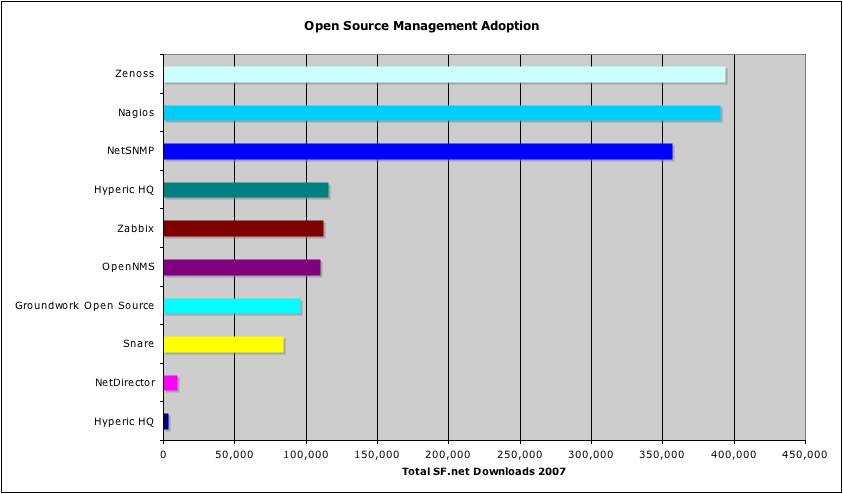Open Source
Open source is a term that was coined in the late 1990s to encompass a series of free software licences that give various levels of freedom to the users of software. On the one hand you have so called copyleft licences like the General Public License or GPL that place some restrictions on the user to other much more liberal licences like the BSD license that place very few restrictions on the user. All of the licences give the user access to the source code of the software and allow them to modify the software. The user is then able to re-distribute the modifications as they see fit.
Open source network management comparison: General
Open source network management comparison: Introduction
One side effect of the increased competition in open source network management is that it is becoming increasingly hard to choose which tool is right for you.
With that in mind I intend to create a comparison featuring the best known open source tools to make the process of choosing the right tool a little bit easier.
I’ll publish the comparison in tranches so that, by the end of it, a comprehensive comparison is available. The first tranches will present more general information. As the series progresses more detailed information will be presented.
Open source network management comparison: Platform
Hub projects in open source network management
Almost as a doodle I thought I’d create a graph depicting the dependencies between a selection of open source network management projects.
Once I’d done it, it occurred to me how much just about everything depends on just a couple of projects or project variants of, RRDTool & Net-SNMP.

The main conclusion I draw from the above graph is that if you wish to create a thriving platform for open source network management, you’d better have something like those two hub projects.
Creating open source software using Microsoft's .NET framework
Whilst developing PowerTime, I’ve kept in mind the requirement that I need to ensure that the software can be built using only freely available tools.
Of course we will eventually provide an installer, but I like the idea that people can build the software on their own machine if they want to.
One way to make self building easier is to minimise the number of external dependencies required. To that end, everything is written in C# and only standard .NET framework libraries are used. No external libraries are required to create a functional build.
Open source software from a VAR perspective
How can a network & systems management Value Added Reseller (VAR) benefit from offering open source solutions and what are the potential problems?
Any VAR not offering genuine added value is going to be left out in the cold. A “SKU” VAR, a company that expects to take orders with the minimum of fuss, are going to have a problem. But then, that’s the way commercial software like What’s Up Gold and Solar Winds Orion is going anyway. The internet is disintermediating the relationship from producer to customer pretty well everywhere especially in the close to zero friction world of software.
Lessons learnt writing open source software
I don’t suppose many of you know my dirty little secret: I’m a failure. There I’ve said it. I founded an open source project and failed miserably. Sorry! Please wait there whilst I go outside to self-flagellate…that’s better the open source gods have been salved.
Back in 2005 I knew there was a tool missing from Apache for ad-hoc searches on access logs. Now, I mean a tool for performing ad-hoc searches not the programmable type. You can use AWK, a very flexible text manipulation tool, for that.
Open source network management comparison 2007
Mark Hinkle from Zenoss sent me a link to an interesting document he prepared yesterday.

I think Mark may be over egging Zenoss clear market leadership but without any doubt their growth over the last year has been impressive.
Perhaps the most impressive thing to take away is that all of the projects featured have grown over the last year.
Open source network management download comparison
One of the great things about sourceforge, apart from the cool services they provide free to open source projects, is that they provide statistics about the projects they host.
One of the stats that sourceforge provides is a history of project downloads. You can’t compare the stats though. So I thought it would be interesting to compare the downloads for the major open source network management projects.
The volume of downloads is indicative, like search trends, of the relative mind share for each project. Download volume isn’t a perfect measure, but it is one of the best available. I doubt even the projects themselves have an absolutely accurate idea of how many installations they have.
